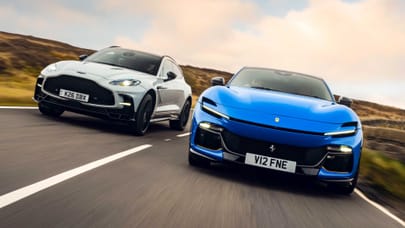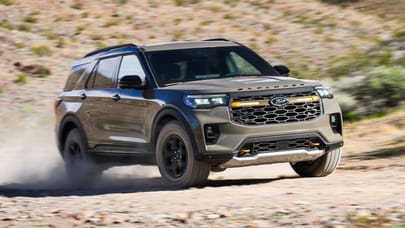
Ford has killed its seven seater electric SUV, next full EV will be a van
The planned three-row e-SUV will instead become a hybrid in move that could cost $1.5bn. Ouchy
Ford has scrapped plans to build a three-row, seven seater electric SUV powered by next-generation electric technology, citing an influx of Chinese competitors, “rising compliance requirements” and the simple fact that customers want cheaper electric cars.
It means it’ll take a “non-cash charge” of $400m to write down the manufacturing assets needed for the three-row e-SUV and could result in a further $1.5bn worth of costs.
Ford also confirmed its spending on electric car development will drop from 40 per cent to 30 per cent.
“We learned a lot as the No.2 US electric vehicle brand about what customers want and value, and what it takes to match the best in the world with cost-efficient design,” said boss Jim Farley.
“We have built a plan that gives our customers maximum choice and plays to our strengths.”
That plan now means the next electric car from Ford will be a new commercial van that’ll be built in Ohio from 2026, building on its success with the E-Transit and E-Transit Custom (pictured above). After that comes a mid-sized electric truck currently named ‘Project T3’. That'll be based on a new platform designed by an in-house Californian skunkworks team created a couple of years ago.
Though originally planned for 2025, the T3 will now arrive in the second half of 2027. Ford said it was “retiming” the launch to take advantage of cheaper, better batteries and “other cost breakthroughs while the market continues to develop”.
Apparently the T3 will offer bi-directional charging capabilities, advanced aero and “features and experiences never seen on any Ford truck”. It’ll showcase whatever Ford’s learned from its experiences with the F-150 Lightning.
And the three-row SUV? That’ll now be a hybrid, offering better range versus an electric car, and fewer emissions versus a pure combustion-engined car.
“An affordable electric vehicle starts with an affordable battery,” said Farley. “If you are not competitive on battery cost, you are not competitive.” As such, it’s moved Mach-E battery production from Poland to Michigan – to take advantage of the Inflation Reduction Act benefits – and will turn on the Kentucky plant earlier than planned.
Looking for more from the USA?
Top Gear
Newsletter
Thank you for subscribing to our newsletter. Look out for your regular round-up of news, reviews and offers in your inbox.
Get all the latest news, reviews and exclusives, direct to your inbox.
And it’ll start building lithium-ion phosphate batteries from 2026. We’ll get another electrification update from Ford next year.
Trending this week
- 2026 TopGear.com Awards
"Engineering at the cutting edge": why the Ferrari F80 is our hypercar of the year








